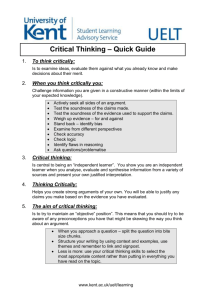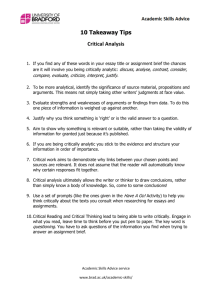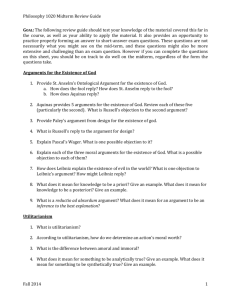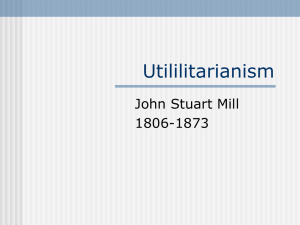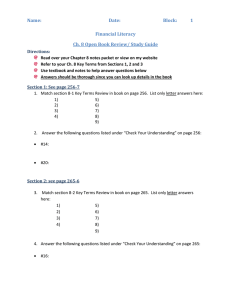BIOETHICS AND BIOTECHNOLOGY F2011 FIRST STUDY SHEET FOR THE FIRST... EXAM DATE: 11 OCTOBER.
advertisement
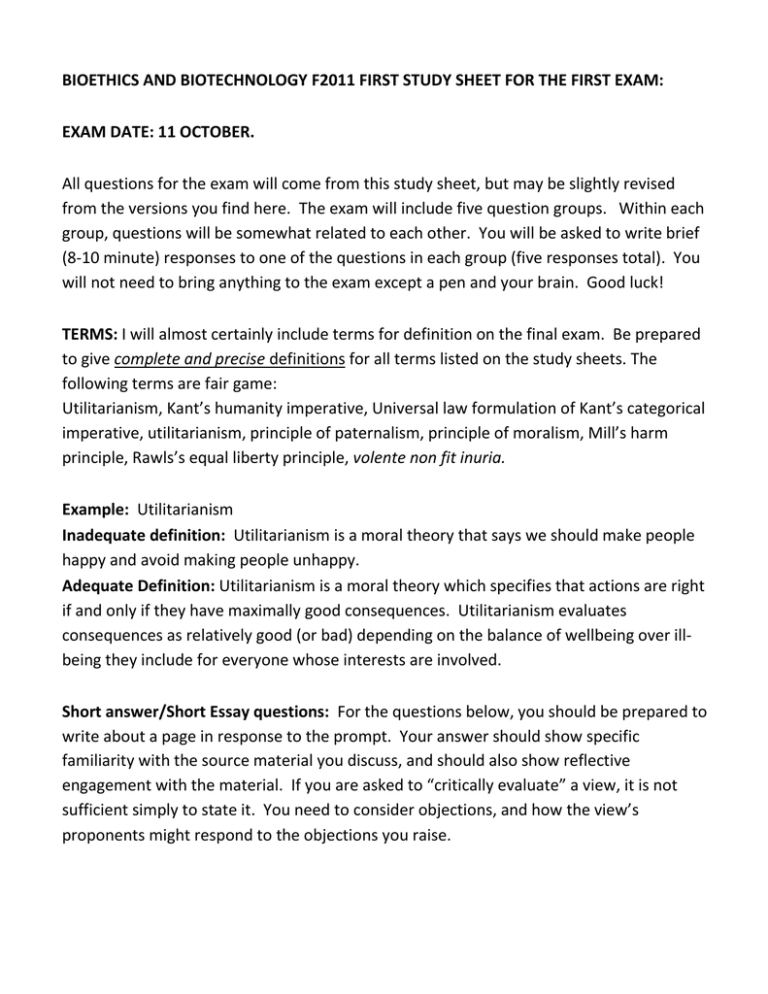
BIOETHICS AND BIOTECHNOLOGY F2011 FIRST STUDY SHEET FOR THE FIRST EXAM: EXAM DATE: 11 OCTOBER. All questions for the exam will come from this study sheet, but may be slightly revised from the versions you find here. The exam will include five question groups. Within each group, questions will be somewhat related to each other. You will be asked to write brief (8-10 minute) responses to one of the questions in each group (five responses total). You will not need to bring anything to the exam except a pen and your brain. Good luck! TERMS: I will almost certainly include terms for definition on the final exam. Be prepared to give complete and precise definitions for all terms listed on the study sheets. The following terms are fair game: Utilitarianism, Kant’s humanity imperative, Universal law formulation of Kant’s categorical imperative, utilitarianism, principle of paternalism, principle of moralism, Mill’s harm principle, Rawls’s equal liberty principle, volente non fit inuria. Example: Utilitarianism Inadequate definition: Utilitarianism is a moral theory that says we should make people happy and avoid making people unhappy. Adequate Definition: Utilitarianism is a moral theory which specifies that actions are right if and only if they have maximally good consequences. Utilitarianism evaluates consequences as relatively good (or bad) depending on the balance of wellbeing over illbeing they include for everyone whose interests are involved. Short answer/Short Essay questions: For the questions below, you should be prepared to write about a page in response to the prompt. Your answer should show specific familiarity with the source material you discuss, and should also show reflective engagement with the material. If you are asked to “critically evaluate” a view, it is not sufficient simply to state it. You need to consider objections, and how the view’s proponents might respond to the objections you raise. “Ethics.” from the Internet Encyclopedia of Philosophy 1) Explain what utilitarianism is, and use utilitarianism to evaluate one of the moral issues we have discussed. (sale of transplant organs, cloning, human genetic engineering, surrogate motherhood…) 2) Clearly state the “universality formulation” (I might ask for the ‘Humanity formulation’ instead) of Kant’s categorical imperative, and explain how one might apply it. 3) What are ‘prima facie’ duties? Explain how one might deliberate about moral questions using a system of prima facie duties like the one Ross recommends. The Ashley Treatment 1) Explain and evaluate Singer’s discussion of the “Ashley Treatment.” 2) Evaluate the “Ashley Treatment” in light of Kant’s Humanity Imperative. (Of course you may argue either that the Ashley Treatment violates Kant’s principle, or that it satisfies Kant’s principle, but you need to explain your view either way. Mill On Liberty: 1) What is Mill’s “one principle” that explains the rightful boundary of government coercion of individuals? Briefly explain why laws prohibiting prostitution or drug use might violate Mill’s principle. 2) What is paternalism? Give an example of a paternalistic law, and explain why Mill would object to such a law. 3) What is ‘moralism’? Give an example of a moralistic law, and explain why Mill would object to such a law. 4) Explain the difference between the “libertarian” and the “liberal” interpretation of Mill’s harm principle, and illustrate the distinction with an example. 5) Explain the difference between hard and soft paternalism, and give an example that makes the distinction clear. Griswold v. CT 1) Describe the facts of the Griswold case, including an account of the statute under review, the infraction that brought the case to court, and the court’s ruling. 2) What is the relationship between the “right of privacy” which the court uses in this case, and the underlying constitutional rights the court uses to derive this right? 3) What are “penumbral” rights? What does it mean to say that the right to privacy falls within the penumbrum of rights guaranteed in the Bill of Rights? Sunstein: 1) Briefly explain the legal argument for the claim that the right to reproductive liberty includes a right to reproduce by cloning. Your answer should cite and show familiarity with relevant case law. 2) Briefly explain the legal argument for the claim that the right to reproductive liberty does not include a right to reproduce by cloning. Your answer should cite and show familiarity with relevant case law. Radin, “Market Inalienability” 1) Explain the concept of “market inalienability.” On Radin’s view, what should guide us as we decide which items should be regarded as alienable in market terms? 2) How, according to Radin, is the notion of market inalienability linked to underlying conceptions of (i) personhood, and (ii) individual liberty? 3) Explain and critically evaluate Radin’s view of surrogate motherhood. 4) Explain and critically evaluate Radin’s account of “baby selling,” and discuss whether the arguments she offers apply to the sale of human ova. Anderson: “ Is Women’s Labor a Commodity?” 1) Explain and briefly evaluate Anderson’s reasons for regarding surrogacy contracts as intrinsically degrading for women who hire themselves out as surrogates. 2) Explain and briefly evaluate Anderson’s reasons for regarding surrogacy contracts as intrinsically exploitative for women who hire themselves out as surrogates. Focus especially on her claim that these contracts exploit attitudes that women “have formed under social conditions inconsistent with genuine autonomy.” 3) Explain and briefly evaluate Anderson’s reasons for regarding surrogacy contracts as intrinsically exploitative for women who hire themselves out as surrogates. Wolf 1) Briefly explain and evaluate Wolf’s argument in favor of a regulated commercial market for transplant organs. 2) Wolf distinguishes between two different kinds of ‘exploitation.’ Explain each of them, and use them in evaluating the claim that “A market for transplant organs would be exploitative, since those who would have a motive to sell would be the poor and the powerless.” Kahn & Mastroianni, “Creating a Stem Cell Donor.” 1) Explain the Molly Nash case, and identify the key ethical issues that are raised by the case. 2) Explain how a modern traditionalist (in Robertson’s sense) would evaluate the Nash’s right to use PGD to insure that their child would be donor-matched with their existing child. SANDEL : 1) Critically explain and examine Sandel’s discussion of the “autonomy argument” against the use of human reproductive cloning. 2) Sandel considers and rejects the argument that the use of medical or genetic technologies to enhance a person’s normal capabilities would be unfair to others. Critically explain the argument, and Sandel’s response to it. 3) Sandel argues that we are better off if we don’t need to regard ourselves as responsible for the way we are. Explain an critically evaluate his discussion of this claim, and his use of this claim as a reason against the use of medical or genetic enhancements. Kass: 1) Explain and critically evaluate, in some detail, Kass’s view about the significance of “repugnance” for regulatory legislation. (Note: ‘Critically evaluate’ does not mean that you have to argue that Kass is wrong. It does mean that you consider and evaluate critical objections that might be raised against the argument.) 2) In some parts of his paper, Kass employs an ‘argument from naturalness’ in support of a ban on human reproductive cloning: in effect, this involves arguing that a practice is wrong because it is unnatural. Explain and evaluate this argument and Kass’s use of it.


